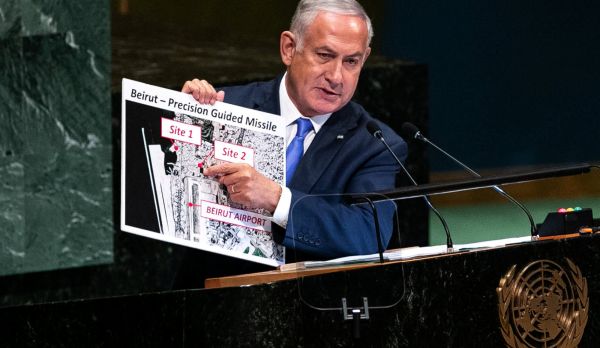The Story of Hezbollah’s Soccer Team Netanyahu Mentioned at the UN
الهآررتس: قصة فريق كرة القدم (العهد) التابع لحزب الله الذي ذكره نيتانياهو في خطابه من الأمم المتحدة وقال إن تحت ملعبه مخزن ومصنع صواريخ
Uri Levy/Haaretz/September 01 October/18
Netanyahu said what’s been known in Lebanon for a while now: Al-Ahed is Hezbollah’s team. With strong ties to the terror group and control over the league, it’s missing only one thing.
When Prime Minister Benjamin Netanyahu mentioned “the Hezbollah team” during his speech to the UN General Assembly on Thursday he literally meant a soccer team.
Speaking of Hezbollah’s missile installations, Netanyahu noted that there were missiles hidden in a soccer stadium. The field in question is home to the Al-Ahed sports club, Lebanon’s champion, and Hezbollah’s team.
Netanyahu did not choose the team’s name by chance. Western media outlets like to call Al-Ahed “the Hezbollah club,” among other reasons because of the dominant yellow color and the speeches given by Hezbollah chief Hassan Nasrallah at recent championships.
In 2008, for example, the team won the championship and festively presented the title to Nasrallah. Bilal Arakji, a board member for the rival team, Nejmeh, told The Guardian at the time that Al-Ahed’s connections to Hezbollah have made the situation in the league impossible. “Ahed and Hezbollah want to take the championship, by force if they have to. Why? What about Hitler and the 1936 Olympics? Why did he want to win that? Ahed won the league last season and presented Hassan Nasrallah the cup. They said it was another victory [for Hezbollah].”
To this day no specific documentation has been found for the transfer of funds from Hezbollah to Al-Ahed, but through the years Hezbollah members in the fields of education, culture and others, have held senior management positions in the club. In addition, between the end of the last decade and the current one, Al-Manar TV, which is owned by Hezbollah, was Al-Ahed’s sponsor. Indeed, when Al-Ahed won the cup, Al-Manar broadcast the team’s highlights. And in 2016, a former team member, 19-year-old Kassem Shamkha, one of the club’s best-known young players, was killed fighting for Hezbollah in a battle in Aleppo, Syria.
The team’s fan base is indeed Shi’ite, but the games fail to draw a crowd. Last year’s championship game was attended by a paltry 2,000 spectators, but Al-Ahed has creative ways of drawing them in. In the 2015/2016 season, the club managers put signs outside the stadium promising a free falafel to anyone who came to the game.
Al-Ahed’s links to Hezbollah, which began when the club was founded in 1964, tells the story of Lebanese soccer more broadly. Al-Ahed was founded in the southern suburb of Beirut, Dahiya, and that is where the team played in the past. But wars and the situation on the ground forced the team to move to the Ahed Stadium, the one Netanyahu mentioned in his speech.
The field is near the Rafic Hariri Airport near Bourj el-Barajneh. The incredible fact is that like Al-Ahed, every sector in Lebanon and in Beirut has its own soccer team. Out of the 12 groups in the premier league, six come from the capital. There is therefore a large number of derbies, which bring together fans from rival clubs on a weekly basis.
And so it should come as no surprise that the Al-Ahed’s greatest rivals are Ansar, the star team from the 1990s, which is identified to this day with the Hariri family and represents the patriotic-secular-nationalist Lebanese sector; and Nejmeh, a huge club that is the favorite in Lebanon today. Nejmeh fans stress their “all-Lebanese” identity – they do not see themselves as Arabs, but rather as Lebanese, and their fans are made up of a variety of Sunnis, Druze, Shi’ites, Christians and even Armenian Catholics.
Two years ago Nejmeh refused to come to a championship game against Al-Ahed, which the soccer association had wanted to move to a neutral field with no spectators present, claiming that “Hezbollah was once again ‘seeing to’ Al-Ahed’s title.” Al-Ahed won a 3-0 technical victory, and won the championship by three points.
Internal tensions in Lebanon, together with Hezbollah’s political involvement, have frequently led to match postponements. Tensions have also led to many games held without spectators and have fatally hurt professional soccer in Lebanon. Since 2015, however, the league has played uninterrupted.
Today Al-Ahed is the number one team in Lebanon. It has won six championships, three in the four most recent seasons. Some of Lebanon’s most prominent play for the team, Rabih Ataya, Mohamad Haidar and the young talent Mohamad Kdouh. A Bulgarian forward by the name of Martin Toshev joined the team this season and scored three goals in his debut, leading to a 6-0 victory against the Druze team Al-Safa.
**Uri Levy is the founder of BabaGol and an expert on Middle Eastern soccer.






















